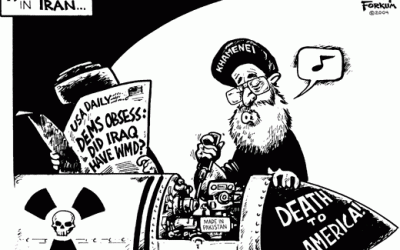The truck attack at a Christmas market in Berlin has cast a lurid spotlight on German authorities. The police apparently knew the suspect, had evidence of his ties to jihadists and believed he posed a threat.
Yet 12 people are now dead. Last August, we saw a truck used as a weapon of jihad in Nice, France, so why didn’t police prevent this one?
The grim truth is that, at best, the homeland defense model is like an endless game of jihadist Whac-a-Mole.With each new kind of murderous attack, we patch one more gap, harden yet more soft targets — and sometimes we thwart a plot, sometimes not. We will improve, but this approach just cannot eliminate the jihadist threat.
Many wonder: Could we ever stop these attacks?
The answer is “yes,” but to do that is going to take a fundamental mind shift.
The place to start is by recognizing that we face not some nebulous threat from “terrorists” or “violent extremists,” but a distinct enemy: the Islamic totalitarian movement. We need to properly identify the nature of that enemy, what makes it tick and therefore how to stop it.
That’s spelled out in my book “Failing to Confront Islamic Totalitarianism,” but here’s the gist: We need to take seriously three crucial truths that, since 9/11, have been obscured by layers of misunderstanding and evasion.
1. The enemy is defined, not primarily by its terrorist means, but by its ideological ends.
The jihadists fight to expunge any shred of freedom and secular government. They fight to create a society subjugated under Islamic religious law (sharia) wherever they can.
True, there are many jihadist factions, they fight amongst themselves and they differ over strategic priorities and tactics. But what unites them is their common goal. And they slaughter infidels and unbelievers in the name of realizing their vision of Islamic totalitarianism.
It’s a farfetched vision, but what matters is that the jihadists embrace it.
2. Jihadists choose to become holy warriors.
Jihadists, we’re often told, are products of socioeconomic factors outside their control.
President Obama would have us look to poverty, a lack of opportunity and political alienation. The Democrats’ 2016 nominee, Hillary Clinton, suggested that mental illness and rage are important factors.
None of that fits the data. Many jihadists are educated, middle-class and ordinary.
Present-elect Trump has floated another kind of deterministic account. In certain moods, he talks as if someone’s innate cultural background or race makes them a holy warrior (see, for example, how he hammered on the fact that the Orlando shooter’s parents were Afghans, and his calls for an immigration ban on Muslims).
That’s false, too.
It’s about choosing, and acting on, a set of ideas. Think of John Walker Lindh, who turned away from his Marin County, California, upbringing and joined the ranks of the Taliban. Or, on the flip side, consider Ayaan Hirsi Ali, who grew up in a culture saturated with Islamist ideas, but has become a valiant champion of secular values and freedom.
Let’s stop pretending that becoming a jihadist somehow happens to people. Catching the flu happens to you. Becoming a jihadist, a self-styled soldier of Allah, is something you make happen.
What these fighters choose to embrace is a (perverse) ideological vision. Until we realize that, we won’t be able to fight them effectively.
3. To defeat the enemy, focus on its crucial state-sponsors.
For decades, the jihadist cause has been inspired, nurtured and funded by patrons such as Saudi Arabia, the Gulf states and, above all, Iran. They are the movement’s sine qua non.
The movement’s foundational group, the Muslim Brotherhood, started out in Egypt in the 1920s, but accomplished little. What supercharged the jihadist cause was the 1979 Iranian Revolution. That shockwave brought to power in Tehran an Islamic totalitarian regime committed to exporting its ideological revolution.
Iran armed, trained, and funded Lebanese Hezbollah, Palestinian Hamas and the Palestinian Islamic Jihad. It has backed insurgent groups in Iraq and Afghanistan.
Meanwhile, the Saudi regime has invested millions of dollars setting up religious schools, distributing books and proselytizing across the globe for its preferred strain of Islamic totalitarianism. Saudi money funds various jihadist groups, including the Taliban. And the Gulf states have bankrolled their favored jihadist factions.
Absent the inspiration and material backing of its state sponsors; the galvanizing spectacle of real-life, functioning Islamist regimes in Iran Afghanistan, the Islamic State in Iraq and Syria (ISIS), and elsewhere; the jihadist cause would have amounted to little more than a bunch of seething pamphleteers and failed revolutionaries.
Such regimes make the ideal actuating the jihadists appear righteous, potent and practical.
Confronting these state sponsors is key to defeating the jihadist cause. We need more than the Whac-a-Moleapproach to the jihad; fundamentally, we must demoralize the movement.
Once we recognize that jihadists choose their ideology — that that they’re not pushed onto that path by innate or outside forces beyond their control — we can take that choice away.
To deter jihadists and would-be recruits, it’s crucial to demonstrate that their totalitarian vision is unrealizable, that their cause is doomed. An indispensable step is to focus our full diplomatic and military resources on the movement’s inspiration and patrons, including ISIS, but chiefly Saudi Arabia and Iran.
Islamic totalitarianism will wither only when our enemies are convinced the West is willing to defend itself with overwhelming force and unflagging commitment. But to do so, we must first understand the enemy.
We have not come close to doing that.
First published in The Hill. Image by Bosch Fawstin.




